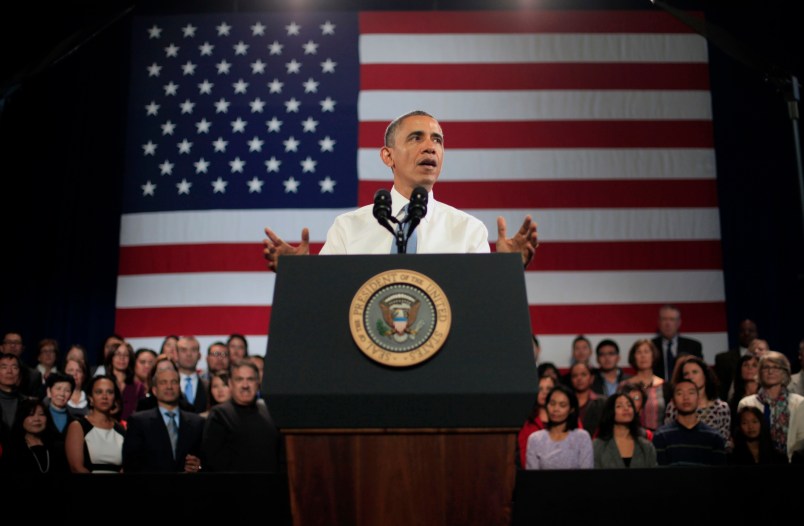President Barack Obama on Monday swiped critics of the interim agreement struck between six world powers to halt Iran’s nuclear program.
“We cannot close the door on diplomacy. And we cannot rule out peaceful solutions to the world’s problems. We cannot commit ourselves to an endless cycle of conflict. Tough talk and bluster may be the easy thing to do politically, but it’s not the right thing for our security,” he said in a speech in San Francisco, where he also spoke about immigration reform.
The agreement, announced Saturday night, comes as Congress has been eying tougher sanctions against Iran. That would now get in the way of the interim deal, which requires Iran to freeze its nuclear program for six months and permit regular international inspections, in exchange for lifting some $7 billion in existing sanctions, while negotiators eye a longer-term solution.
The deal has faced criticism in Congress, including from Sen. Chuck Schumer (D-NY), usually a strong Obama ally, who called it disproportional. But there appears to be an appetite in the Senate to give it some breathing room. One option being considered is to pass legislation that allows the deal to work while triggering new sanctions if Iran violates the terms.
“I expect that the forthcoming sanctions legislation to be considered by the Senate will provide for a six-month window to reach a final agreement before imposing new sanctions on Iran, but will at the same time be immediately available should the talks falter or Iran fail to implement or breach the interim agreement,” Senate Foreign Relations Chair Bob Menendez (D-NJ) said after the deal was announced.
“I will continue working with my colleagues to craft bipartisan legislation that will impose tough new economic sanctions if Iran undermines this interim accord or if the dismantlement of Iran’s nuclear infrastructure is not underway by the end of this six-month period,” said Sen. Mark Kirk (R-IL), who has been pushing for new sanctions against Iran.
These comments came after a group of 14 senators, including Menendez and Kirk, vowed in a joint statement last Thursday to pass legislation sanctioning Iran, calling a nuclear-capable Iran “a grave threat to the national security interest of the United States and its allies.”
Senate Majority Leader Harry Reid (D-NV) on Monday praised the arrangement as “an important first step” but left the door open to imposing tougher sanctions on Iran.
House Speaker John Boehner (R-OH) also left some room to give the deal a chance, while calling for “healthy skepticism and hard questions, not just of the Iranians, but of ourselves and our allies involved in the negotiations.” He said that the “House looks forward to the Administration providing a briefing on the interim deal and the next steps.”
There are some lawmakers who want to nix the agreement. Sen. Ted Cruz (R-TX) echoed Israeli Prime Minister Benjamin Netanyahu in saying the deal was an “historic mistake” and called on the White House to “reverse course before any further damage is done.”
Obama has the authority to lift the sanctions on his own. Depending on Iran’s actions and where the votes are, Congress’s decision could come in the National Defense Authorization Act or separate standalone legislation. Aides say it’s still early to know what’ll happen.
“For the first time in a decade, we’ve halted the progress on Iran’s nuclear program,” Obama said. “Now, this progress, and the potential it offers, reminds us of what is possible when the United States has the courage to lead — not just with the force of arms, but with the strength of our diplomacy and our commitment to peace. That’s what keeps us strong. That’s what makes us a beacon to the world. That’s how I’ll continue to lead so long as I’m President of the United States.”






